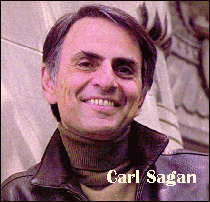The Case for Science
(Carl Sagan: The Demon-Haunted World - Science as a Candle in the
Dark. New York: Random House, 1996. 457 pp., $25.95 U.S., $35.95 Canada.)
Reviewed for the American Reporter by Jeff Schult.
(Reviewer's note: I decided to leave this up, as is, after Carl Sagan's death. Perhaps
he wouldn't have put it this way, but he will live on long after death for me, wherever he
is. We don't get many heroes any more, do we ...)
Derby, CT -- Just in time for Millennialist Fever, Carl Sagan raises his voice ever so
slightly in defense of reason. That Sagan felt he had to write "The Demon-Haunted
World" at all is depressing, but the book will serve as a candle in the dark to those
desperately pressing the cause of Science, Reason and Skepticism in an anxious world.

The book is a bubble-burster and will delight the hardheaded with its thorough and amusing
debunking of contemporary pseudoscience. Alien abduction believers, crystal healers and
Psychic Hotline fans will take offense. So will anyone who would rather posit a
supernatural explanation for the extraordinary than subject the extraordinary to analysis.
Even the more sensitive of those with more traditional religious belief systems are liable
to cry foul.
How dare he?
Sagan dares because he sees his beloved hard science being set aside for a bunch of
comforting claptrap, and he fears for the future of a technological society in which
hardly anyone understands technology. Too many people are like his courtesy driver at a
speaking engagement; they know more about aliens, pyramids and the Atlantis legend then
they do about the Periodic Table.
I don't know just how loony American society is, and Sagan takes some too-easy shots
along the way. He devotes some space and merciless prose to the more fanciful of the
tabloid press, the kind that uses front page photographs of peace-seeking visitors from
beyond the Pleiades shaking hands with the president. Call me dangerously naive, Carl, but
I have long been under the impression that people buy such publications because they're
funny. Just because the "Weekly World News" is profitable does not mean we are
heading into a new Dark Age.
But the overall evidence Sagan presents for the argument that the world is going gaga
is compelling, though frequently anecdotal. He tries to be polite about it; one suspects
that he could have vented a lot more spleen on the subject and probably does elsewhere.
But here he is trying to win the undecided vote, seeking to reach and gently tug at the
intellect of those prone to abandoning it.
Admittedly, I'm with Dr. Sagan on this one, and have been mostly in his camp for all my
life. Those who wish to see science nitpicked, ridiculed and vilified have ample reading
material these days. The testimony of alien abductees is compelling even to some prominent
psychiatrists; New-Age beliefs are trumpeted from the top of the New York Times bestseller
lists; Creationism is passed off by some as at least the intellectual equal of Evolution
and certainly the more moral belief.
All this is repugnant to the author, who states the case for Science with the clarity
of language that has made him the leading spokesperson for the scientific community for
the better part of two decades. Science is not a belief system; it is a discipline that
demands the weight of evidence for its theories and truths. And it takes a lot of hard
work and education to make a good scientist, far more than it does to make a good faith
healer or astrologist.
Sagan does not profess a problem with belief systems as comforting philosophies to
explain what we cannot know; he makes it his business, however, to dissect human
gullibility in matters where science can be used to test. He does so in such a way that
will invite dismissal from the more fervent deists of the world, however. He would like to
believe that there is a Heaven or some form of reincarnation so that he might be reunited
with family and loved ones in eternity, he writes; sadly, his training leads him to
believe that the possibility is remote.
But for the scientist, Sagan argues eloquently, there is more wonder in nature, more
mystery in the universe, more delight in the process of understanding than can be provided
by any body of thought that relies on a substantial mythology, or worse, parlor tricks and
superstition.
How do we make more people understand that and appreciate Science and its proper role
in human affairs? Predictably, perhaps, Sagan's prescription requires of society those
things it seems least likely to give without having first gained the appreciation he
seeks. Better, more educational television. More government subsidies for research and
pure science. Better pay for more teachers. Innovations in teaching. Longer school days
and years.
That we will elect to make those choices as a society is, in sciencespeak, improbable
at this point. But Sagan has put those choices on the table, and they deserve to be there.
To Home Page
